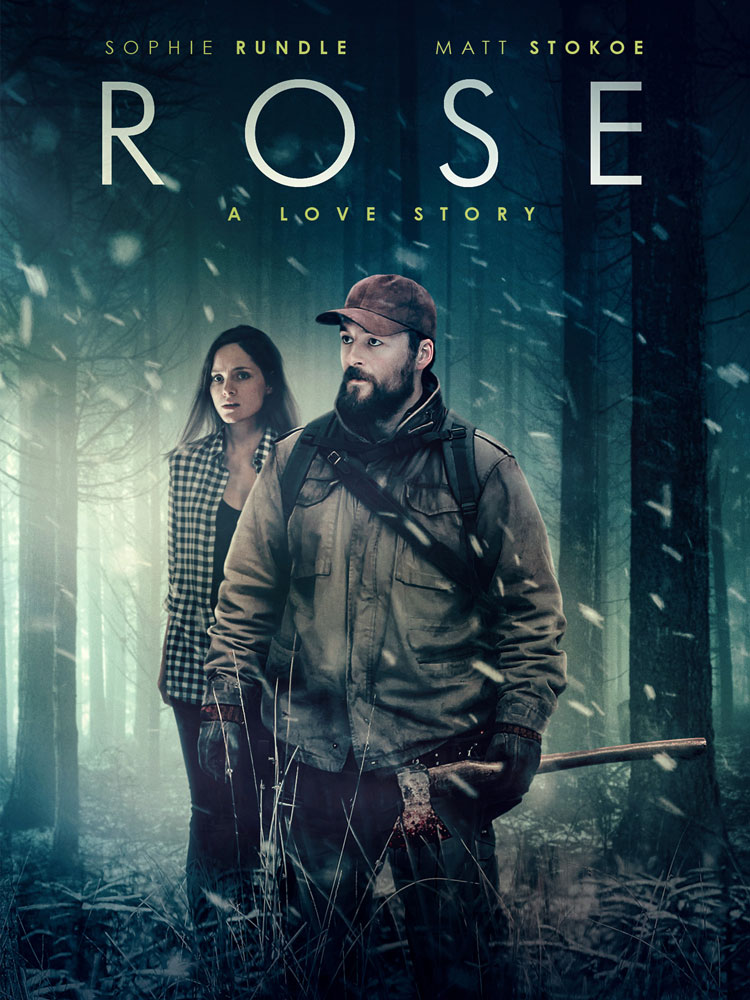Directed by Jennifer Sheridan and written by Matt Stokoe Rose: A Love Story is a chilling horror thriller which follows Rose, who lives in seclusion with her husband and gripped by a violent, terrifying illness. However, the arrival of a stranger shatters the fragile refuge they have built…
Starring Sophie Rundle (Peaky Blinders, Jamestown, Bodyguard) and Matt Stokoe (Cursed, Jamestown, Misfits), Rose: A Love Story is a subtle and terrifying horror that flips horror tropes on their head and explores the genre in new and unexpected ways.
We spoke to director Jennifer Sheridan about surprise snow storms and creating a scary Sophie Rundle…
How did you first get involved with Rose: A Love Story?
My agent Robert Taylor sent me the script because his agency also represents Matt [Stokoe] as an actor and he’d written it just off his own back. As soon as I read it, I was like: “I really love this. It’s brilliant and I really would love to make it.”
Obviously, in the world of features you always want to make a feature, but you always feel like it’s such a pipe dream. You’re like: ‘Oh, yeah, I’d love to do that.’ But whether it will happen or not…. So the fact that it actually happened, and we made it was just pretty epic.
Did your vision of the film change as you were making it?
Well, the final version is quite different to what I initially envisioned and a lot of that has to do with the location that we found.
The film really started to take on its own identity once we found the forest [that it’s set in] because it just lends so much to it. Then on top of that, when we actually went to shoot, we had a huge snowstorm! We were completely snowed in, there was no internet or phone signal.
It wasn’t claustrophobic, because we all had such a lovely time but it just really lent a different quality. The snow brought a much more isolating, cold feel to the whole thing, which we totally embraced and just made part of it and I think it makes it really special.
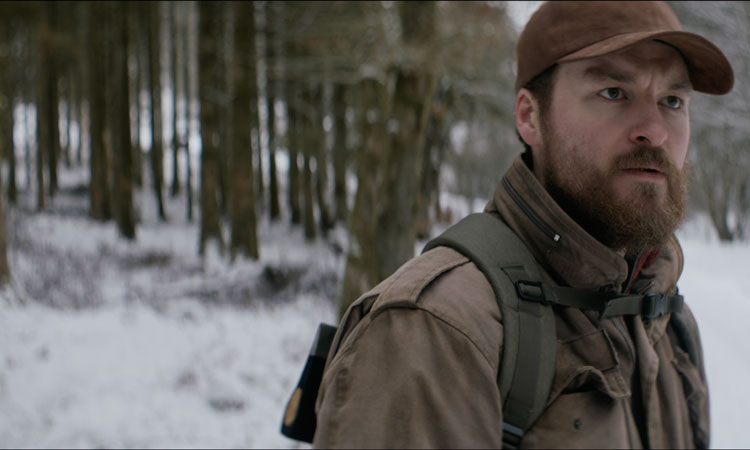
Rose is such an intense film, how did you manage to create the tension within it?
Well, I think it helps that we were living in that environment. That forest does feel quite imposing and you feel a bit insignificant when you’re surrounded by these massive trees, and no one can reach you on the phone. So you think: ‘I could die!’
I do have a theory that it’s because I’ve got a background in editing comedy (which is unusual for the film that I’ve made!) because, in comedy editing, it’s all about timing and punchlines, and cutting to the joke. What was so lovely about making Rose was that I was allowed to kind of hold those moments and let them play out a bit longer, and just linger on things and hints of things and really draw the story out with the audience in a slow way.
What was so enjoyable about it was getting to tell a story that slowly unravels over this period of time with these two characters. So it’s very concentrated and that was really fun
Is the editing process harder or easier when you’re directing?
I tell you what’s so brilliant about a background in editing is that when you’ve only got 15 days to shoot a feature film, you know you have to be economic about what you film! I was always looking for ways to not have to cut. There are a few scenes in the film that play out in one shot, because I was just like: ‘If I can cover this, methodically, in a way, that doesn’t mean I have to get this cutaway in the time that I’ve got, it’s going to help.’
So I really planned that and having an editor’s brain is so helpful, because once you’ve got it, you’re like: ‘Well, I know I’ve got that.’ It might not be the most elaborately covered scene that you would want to do as a director but when you don’t have time or money, it’s a godsend, because you’re just like: ‘Okay, I know, I can get across what I need to get across from this scene in this amount of shots.’
Also, when you’re working with actors like Sophie [Rundle], Matt [Stokoe], and Olive [Gray], who are just incredible, sometimes we didn’t have to do more than two takes! That’s how good they are, and that also helped a lot.
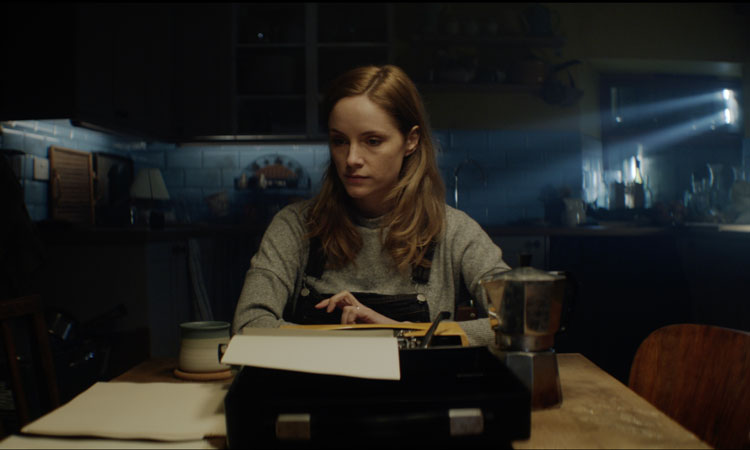
For a supernatural film it’s incredibly grounded…
I think that’s really a testament to Matt’s writing, because I think he wrote something that felt very authentic and very real. He used his own experiences to do so and it shows in the script. Even though it’s a very particular thing that they’re dealing with [in the film], a lot of us can relate to those kinds of situations, when you’re trying to help someone that you’re very close to but you know that you can’t manage them all the time. You also have to live your own life and you have needs sometimes.
It’s always that push and pull between lover and carer. When one of you takes on that caring responsibility, it’s how much you take on and how you maintain a romantic relationship in that dynamic. It’s really challenging, and it’s something that I’m sure a lot of people have experienced in real life. How you come back from that and maintain a marriage is tough.
Rose blends a mixture of genres – how would you describe the film?
It’s tough because it’s not cut and dry really, it skirts a few areas. I think at its heart, it’s very much a drama, a love drama. But then it depends on how easily scared you are. Because some of my friends who don’t watch horror, are very easily scared and I’m like: ‘What? It’s just a little bit of blood, it’s nothing too bad’ [haha] and then proper horror aficionados are going to be like: ‘Where are all the jump scares?!’
So it sort of falls somewhere in the middle. I don’t exactly know how to define it but luckily the industry is getting more used to these kinds of genre-bending films that do a few different things.
How involved were you with the styling and the makeup process for Rose herself?
Actually, the veins were described in the script really well by Matt and we knew we wanted to change the eyes. It’s difficult because when you are dealing with an actress like Sophie Rundle, who’s one, very beautiful, but also, quite petite in stature, how do you make her threatening?
In terms of the sound she makes when we were doing the sound design for her – that was a huge challenge. Your instinct is to use growls but you have to believe that it’s coming out of her body, that her oesophagus can make that noise. So curating the noise that she made took a lot of time. How can make it more feminine, but scary?
It was a really fun challenge, but it took a long time to get there. It’s the same with those visual aspects. How much do you change her? And how much do you do? How much do you see of it?
I liked that it felt like something any of us could have, the vein thing and the eye thing. It was like: ‘This is the scary version of Sophie Rundle.’
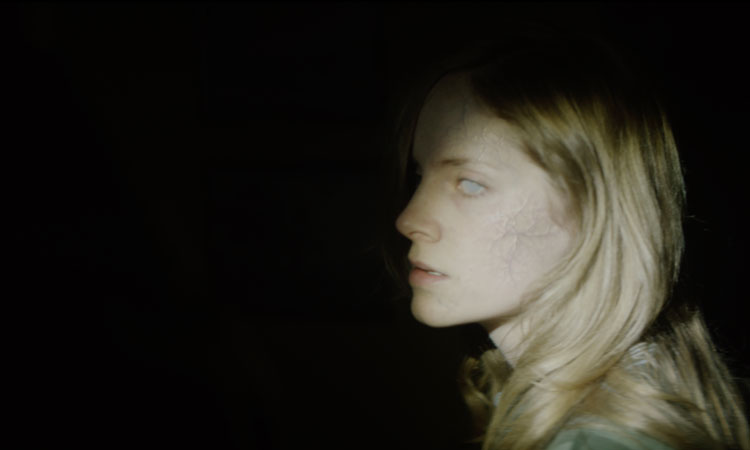
Matt Stokoe wrote and starred in the film. Was it helpful having the writer on set?
He was really respectful of my vision and he was very much concentrating on his performance, which was incredible. But it was so helpful having him there to discuss things like ‘so this part of the script when you’re dealing with this in the forest, or you’re doing this… how did you see that when you wrote it?’.
If anything is too open to interpretation, it’s worth having those conversations with the writer. So having him there was incredibly valuable, he’s really collaborative, as is Sophie. Sophie was very involved in the script as well and neither of them are precious. They’re both very open people which made it a really fun experience.
At what point was the title, Rose: A Love Story, added to the film?
Well, that title was actually on the first draft of the script, it said, ‘Rose’, and in small letters: ‘A love story’. When we were shooting the film, it was always just called Rose and then it comes back down to that genre thing. It felt relevant again, when we got into post production. It felt like it made sense to have that subtitle because we wanted people to know that what they were getting into was, at its very beating heart, a story about love. Challenging, very challenging love, but love.
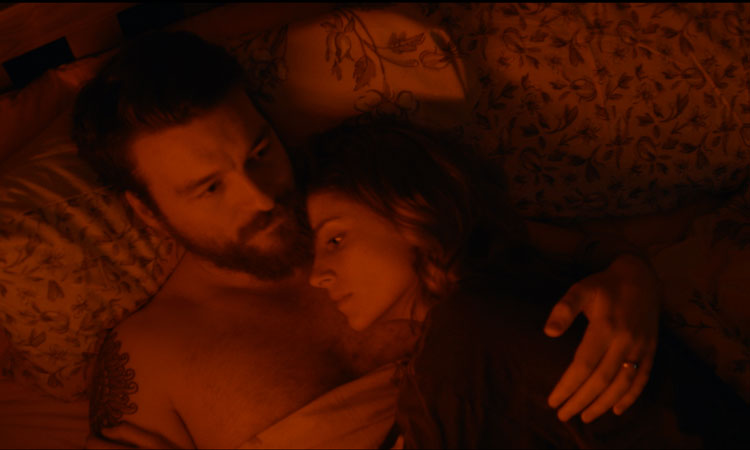
What’s next for you?
I’m in the middle of prep on a four-part BBC One drama. Which is very exciting. I don’t know how much I’m allowed to say actually. Hopefully it will be airing later this year but we’re going to start shooting in April. So wish me luck because it will be my first Covid shoot!
Would you be prepared for another surprise snow storm though?!
Snow in April? That’d be crazy. I’ll make it work though, you know I can make it work!
Signature Entertainment presents Rose: A Love Story on Digital Platforms 5 April
